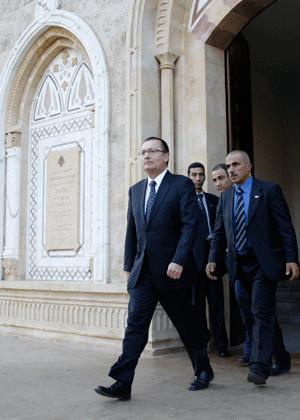
|
| Feltman |
BEIRUT – U.S. official Jeffrey Feltman said Wednesday the United States would support the Lebanese Army to secure its borders with its neighbors.
Feltman, who arrived earlier Wednesday, also told reporters at the Grand Serail after meeting Prime Minister Najib Mikati that Lebanon is conscientious of its commitments toward the Special Tribunal for Lebanon and United Nations Security Council Resolution 1701.
The U.S. official confirmed he would be meeting with Parliament Speaker Nabih Berri and officials from the March 14 coalition and the government.
Feltman also said that there is an international consensus to explore peaceful means to pressure Syrian President Bashar al-Assad. He also said that such consensus was very important as it revealed what the region and the international community want.
The U.S. welcomed Lebanon’s decision to fund the Special Tribunal for Lebanon, Feltman said, adding that Lebanon and the Lebanese people recognize obligations set by the international community.
Feltman also said that Lebanon’s leadership recognizes Lebanon’s interests regarding events in neighboring Syria.
President Michel Sleiman refused to meet with Feltman, in a tit-for-tat move after U.S. officials declined to meet with the president when he was in Washington earlier this year.
Feltman was met by U.S. Ambassador Maura Connelly upon arrival at Rafik Hariri International Airport shortly after midday.
Feltman, who served as ambassador to Lebanon from 2004 to 2008, will also meet Progressive Socialist Party leader Walid Jumblatt, according to Lebanese media.
His visit comes following months of criticism by Washington over Lebanon’s failure to agree on a plan to fund a U.N.-backed tribunal probing the assassination of former Prime Minister Rafik Hariri and repeated warnings to Lebanon about adhering to sanctions on neighboring Syria.
Earlier this month, Feltman told Al-Arabiya television station: “We expect Lebanon to completely implement its international commitments because the Special Tribunal for Lebanon (STL) was established upon Lebanon’s request.”
With the United States and its allies tightening economic sanctions on Syria, the international community is keeping a closer eye on Lebanon, which has traditionally been a refuge for Syrian money laundering. Today, Lebanese banks are under more pressure than ever to scrutinize Syrian accounts.






Leave a Reply